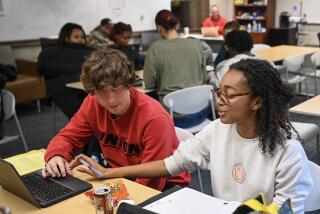Honorable Choices : Although one study shows 75% of students will cheat if they get the chance, a veteran teacher finds trusting her charges is the best way to foster honesty.
- Share via
With five years of empirical classroom observation behind me, I know the honor system works. But I hadn’t thought much about why until I saw Mel Gibson’s new movie, “The Man Without a Face.”
In the character of Justin McCloud, Gibson appears before a child-welfare bureaucrat. A lawyer asks why he hasn’t verified something a boy has told him. Gibson replies that a teacher can’t teach trust unless he first trusts his student. Even the lawyer can’t argue with that.
But can we ever trust kids? Michael Josephson, founder of the private Josephson Institute for Ethics, released a study last fall saying 61% of high school students admit to cheating on an exam at least once. A survey reported in the Boston Globe put the number at 75%.
I have no scientific surveys, only my experience in my classroom. I have concluded that the more opportunities students have to make their own choices, the more frequently they choose what’s right.
During my student-teaching days in North Hollywood, I had a creative, pragmatic master teacher. Tired of students’ coming to class without pen, pencil or paper and then using that as an excuse to idle rather than work, she maintained a small store in her desk from which students could purchase necessities.
When I got my own classroom, I did what every good beginner does; I borrowed her idea. I set aside a cabinet at the rear of the classroom labeled “Mack’s Student Store.” What I hadn’t counted on were continual interruptions: “Mrs. Mack, can I buy a pencil?” “Mrs. Mack, do you have change for a 20?” “Mrs. Mack, I need a pen, but I don’t have any money.”
So the store went to the honor system. Next to the supplies I kept a small amount of change and a stack of blank IOUs.
The students didn’t believe it. “You want me to make my own change?” “I can leave an IOU?”
Once assured the system was for real, students availed themselves of it often, as if continuously to test my sincerity.
There was some minor pilferage and a few bowed heads during our class discussions on the damage to self-esteem caused by stealing. But the payoff was far greater than the few dollars it cost me.
At the end of the store’s first year, a student wrote in a journal: “I didn’t believe you when you told me to help myself. Nobody trusts me. . . . What I learned in your class is that I’m OK.”
And people ask why I teach.
When I give homework, I expect it to be done, and students respond to the roll call with the number of points they think they earned for it. Forewarned that it could be embarrassing to have claimed completion only to have a lie discovered later on, they answer honestly--mostly. The students take responsibility for their own efforts, unable to blame the teacher for a low grade they assigned themselves. I avoid unnecessary paper shuffling, and the students learn that the most important assessment is an honest self-assessment.
A few semesters ago, in my senior writing class at Sylmar High School, two students turned in nearly identical essays. One put his on top of the stack, the other near the bottom. (Students do not always give teachers a lot of credit for diligence and brainpower.)
It was B work, both of them, but I wrote the following note in lieu of a grade: “Dear Steve and Bill, you can either share the ‘B’ grade--40 points each--or the one who wrote the paper can have the ‘B’ and the other a zero. Your choice.”
The following day I returned the graded essays and told the class about the look-alike papers, mentioning no names. At the end of the period, a very sheepish Bill confessed. He urged me to give Steve the B because he’d earned it. He would take the fall because, he said, that’s what he had earned.
I’ve read plenty of reports about teen-agers and their lack of morals and ethics. And I’m no Pollyanna implying that an honor system for grades will change the future of the world.
But perhaps we need to focus less on our kids and more on the dysfunctional families they live in, the frightening neighborhoods they walk through, the corrupt government officials and worldwide ethnic wars they read about, the heroes accused of beating wives and molesting children.
It’s unrealistic to expect our kids to be any better than their role models. If we provided an atmosphere in which adults are trustworthy, and the kids are trusted, we wouldn’t have any more fears for the next generation than our parents had for ours.
More to Read
Only good movies
Get the Indie Focus newsletter, Mark Olsen's weekly guide to the world of cinema.
You may occasionally receive promotional content from the Los Angeles Times.










